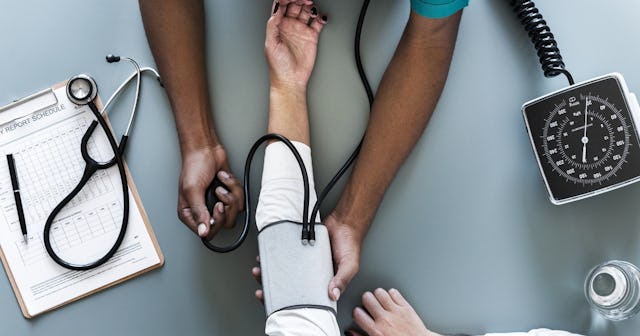What You Must Know About High Blood Pressure And Preeclampsia During Pregnancy

Since visiting your OB-GYN is your new norm as a mom-to-be, you might have noticed that your appointments include your doctor routinely checking your blood pressure. That’s because some pregnant women will experience high or low blood pressure. While this might seem a little nerve-wrecking, experiencing highs and lows in your blood pressure is relatively normal for expectant mothers. Curious about what you need to know whenever you get the blood pressure pump placed on you? Read on to learn how pregnancy affects your blood pressure and how to spot symptoms that need medical attention.
What is blood pressure?
First up, it’s helpful to know what is exactly blood pressure. According to WebMD, blood pressure is the pressure of the blood against the blood vessel walls each time the heart contracts (squeezes) to pump the blood through your body. A blood pressure reading has a top number (systolic) and bottom number (diastolic). Normal blood pressure is 120/80 or less; high blood pressure is considered anything above 140/90, while low pressure tends to be if your reading is below 90/60.
What is low blood pressure?
Low blood pressure is common among pregnant women during the first 24 weeks and is typically no cause for concern since many changes are happening to your body, including your expanding circulatory system, which may cause a drop in your blood pressure. Other factors that affect low pressure, according to Healthline, include dehydration, anemia, prolonged bed rest, and nutritional deficiencies.
Signs of low blood pressure.
Low blood pressure becomes a cause for concern when you’re experiencing symptoms like dizziness, lightheadedness, fainting, nausea, tiredness, and shallow breathing or shortness of breath. Call your doctor or visit your nearest hospital if you’re developing any of the signs listed above.
What is high blood pressure?
Sometimes high blood pressure is present before pregnancy, and sometimes it develops at pregnancy. According to the American College of Obstetricians and Gynecologists (ACOG), high blood pressure that is present before pregnancy or before 20 weeks of pregnancy is known as chronic hypertension. Gestational hypertension is high blood pressure that first occurs in the second half (after 20 weeks) of pregnancy. While ACOG reports that gestational hypertension usually goes away after childbirth, it may increase the risk of developing hypertension in the future.
What is preeclampsia?
If you’re diagnosed with gestational hypertension after week 20, particularly in the third trimester, your doctor will keep an eye out that you’re not developing preeclampsia. Preeclampsia is a serious condition related to kidney function that some pregnant women develop typically later on in the pregnancy, although it can develop earlier. When left untreated, preeclampsia can lead to eclampsia that can affect all of the organs in a woman’s body and put you and your baby at risk.
Signs of preeclampsia.
The biggest sign of preeclampsia is when a pregnant woman has high blood pressure when she’s never had it before. Other symptoms, according to Mayo Clinic, include having a high level of protein in urine and often experience swelling in feet, legs, and hands. Other more serious signs, according to ACOG, are having a low number of platelets in the blood, abnormal kidney or liver function, pain over the upper abdomen, changes in vision, fluid in the lungs, or a severe headache.
What causes preeclampsia?
While there are no clear reasons why some women develop preeclampsia and others don’t, ACOG reports that it’s more common to develop in women who are:
- over 40
- have a personal or family history of preeclampsia
- are carrying more than one fetus
- are pregnant for the first time
- pregnant through in vitro fertilization
- have a history of kidney disease and/or have diabetes and lupus
What you can do.
Whether or not you have high or low blood pressure, it’s always a good idea to keep yourself as healthy as possible throughout your pregnancy. Which means sticking to a nutritious diet filled with lots of veggies and fruits and lean protein, and knowing what’s off-limits, like caffeine and alcohol. Keeping hydrated with water, staying active and going to all of your pre-natal appointments will also ensure that you’re doing your best to reduce all risks of complications.
Written by Brianne Hogan.
This article was originally published on